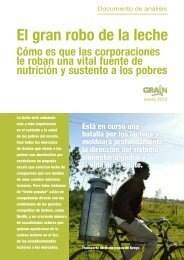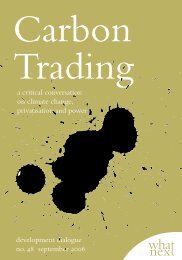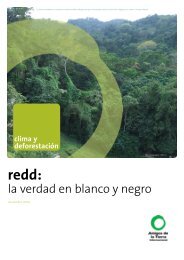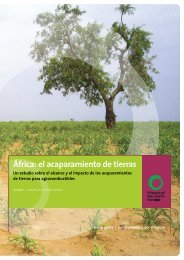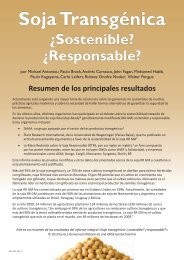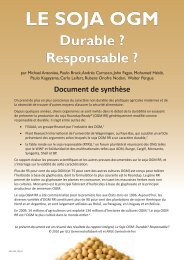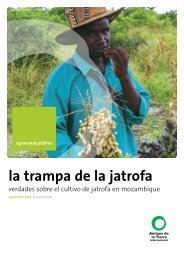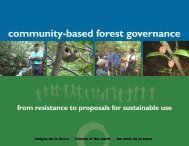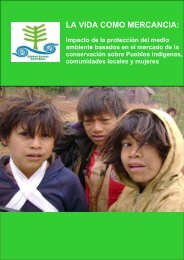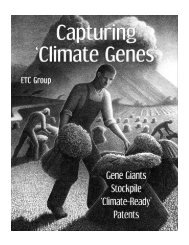Plantations, poverty and power - Critical Information Collective
Plantations, poverty and power - Critical Information Collective
Plantations, poverty and power - Critical Information Collective
You also want an ePaper? Increase the reach of your titles
YUMPU automatically turns print PDFs into web optimized ePapers that Google loves.
91<br />
CEPI Eurokraft states that “it is clear that the distribution itself gives the highest environmental impact<br />
for all of the studied systems”.464 But rather than looking at possible ways of reducing the impacts of<br />
distributing goods, CEPI Eurokraft distorts the findings of the report it commissioned <strong>and</strong> promotes the<br />
use of paper sacks instead of the semi-bulk system using large reusable plastic sacks.<br />
In 2001, CEPI Eurokraft co-sponsored a school project in the UK, which included information on<br />
“growing trees for paper making”, “making paper sacks from paper” <strong>and</strong> “recycling paper waste by<br />
composting”. The project included teacher’s materials, wall posters for the classroom, posters for children<br />
to take home, stickers, recycled paper pots, kraft paper to make sacks, compost <strong>and</strong> tree seeds.465<br />
It sounds great. Children even get to plant tree seeds in the compost “hence completing the cycle” as<br />
CEPI Eurokraft puts it. But, CEPI Eurokraft’s job is to promote the industry, not to educate. There is no<br />
mention in its material for schools of the impacts of the pulp <strong>and</strong> paper industry’s industrial tree<br />
plantations on biodiversity or local people. Neither is there any mention of the vast areas of l<strong>and</strong> that<br />
European companies are taking over in the global South to establish their industrial tree plantations.<br />
“PrintSells” is CEPIFINE’s advertising campaign promoting “the use of paper as an extremely efficient<br />
marketing tool”.466 The campaign urges companies to “Get real with your corporate communication <strong>and</strong><br />
see the benefits immediately.” PrintSells celebrates paper consumption, pointing out, for example, that<br />
between 1954 <strong>and</strong> 2006, the number of catalogues that IKEA prints each year has increased from 500,000<br />
to 192 million467 <strong>and</strong> that more than 2,860 new magazine titles were launched in 2006.468 The<br />
PrintSells campaign promotes just about any use of paper: books, calendars, annual reports, brochures,<br />
catalogues, magazines, advertising <strong>and</strong> junk mail.<br />
CEPI is running another paper promotion campaign titled “paperonline”, with the slogan “ideas start with<br />
paper”. The website tells us that “Paper is all around us <strong>and</strong> the dem<strong>and</strong> for paper is increasing,” <strong>and</strong><br />
“paper is a part of everyday life”.469 On paper <strong>and</strong> climate change, the website notes that under the<br />
Kyoto Protocol, the EU committed itself to “a reduction of minus [sic] 8%”, compared to 1990 levels by<br />
2012. “However,” CEPI continues, “the growth in greenhouse gas emissions since 1990, especially from<br />
the transport sector, suggests that the Kyoto targets are much more ambitious than was envisaged in<br />
1997.”470 The implication that the Kyoto targets are even remotely “ambitious” flies in the face of the<br />
scientific evidence about climate change which dem<strong>and</strong>s reductions of more than 90 per cent. 471<br />
Once a year, CEPI organises the “European Paper Week”, which it boasts is the “European paper <strong>and</strong><br />
464 “LCA of Distribution in Paper Sacks. Executive Summary”, Eurosac <strong>and</strong> CEPI Eurokraft, 2000, page 4.<br />
465 “ETAPS School Pack”, CEPI Eurokraft website. http://www.cepi-eurokraft.org/Etaps.htm<br />
466 CEPIFINE’s website: http://www.cepifine.org/html/index_ns.htm<br />
467 “Instore communication, brochures <strong>and</strong> catalogues”, PrintSells brochure.<br />
468 “Magazines”, PrintSells brochure.<br />
469 CEPI’s paperonline website: http://www.paperonline.org/<br />
470 “Environmental issues”, CEPI’s paperonline website.<br />
http://www.paperonline.org/enviro/level3/issues/issues_frame.html<br />
471 To prevent global warming exceeding 2°C, the world needs to cut emissions to about 15% of the volume in 2000,<br />
according to the Intergovernmental Panel on Climate Change. This would require cuts of 94.4% in the UK <strong>and</strong> 97.7% in<br />
the US. For an explanation of the figures, see George Monbiot (2007) “What is Progress”, Guardian, 4 December 2007.<br />
http://www.monbiot.com/archives/2007/12/04/what-is-progress/



